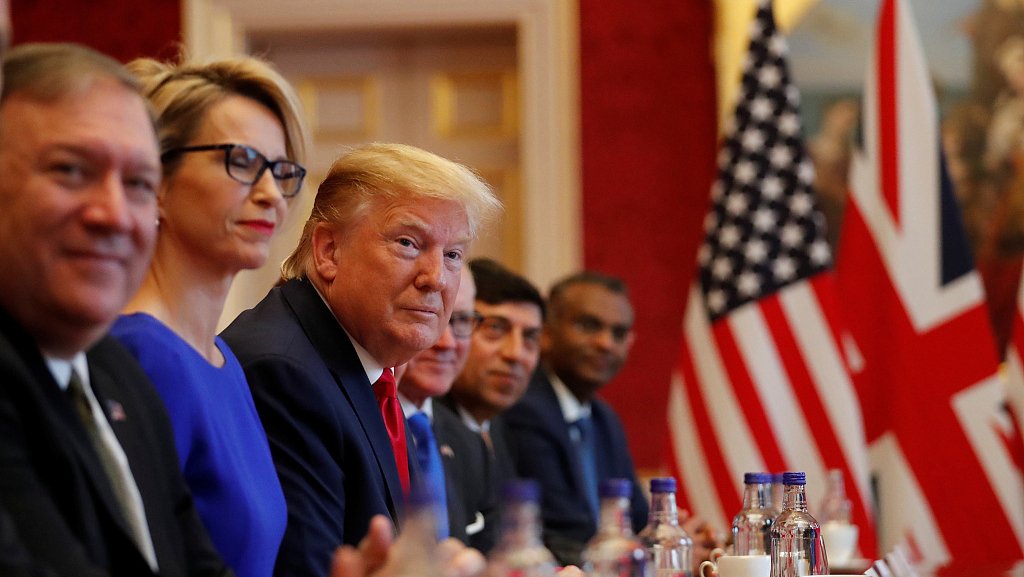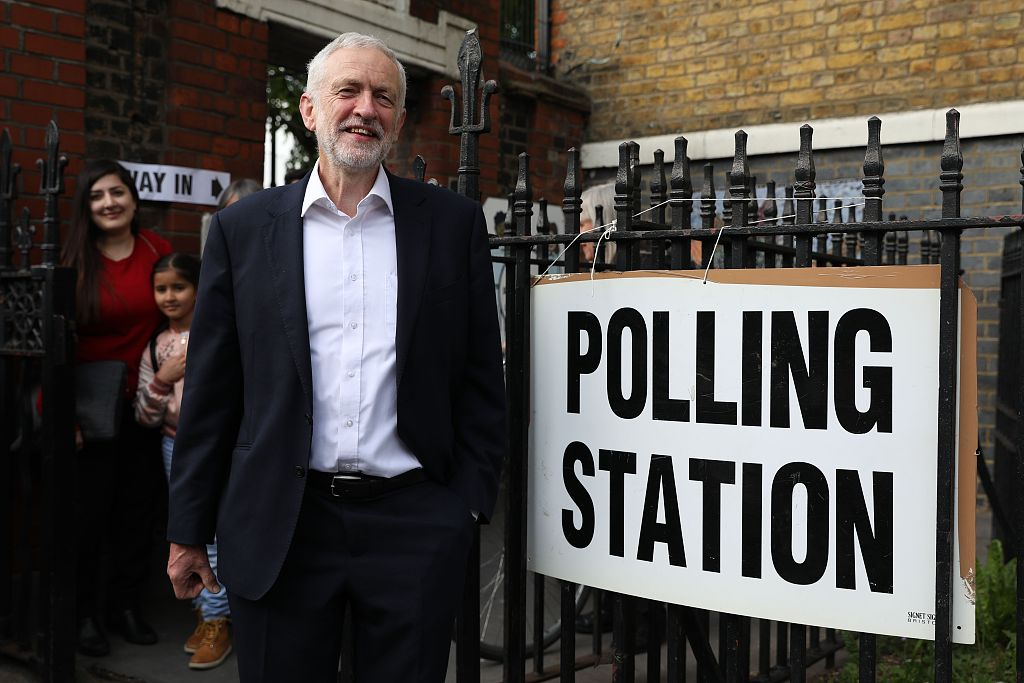
Opinion
12:08, 11-Jun-2019
The Trump administration should not be interfering in Britain's politics
Tom Fowdy

Editor's Note: Tom Fowdy is a British political and international relations analyst and a graduate of Durham and Oxford universities. He writes on topics pertaining to China, the DPRK, Britain, and the United States. The article reflects the author's opinion, and not necessarily the views of CGTN.
Yesterday in an exclusive interview, the U.S. Secretary of State Mike Pompeo stated that on behalf of Jewish leaders he would seek to “push back” against British Labour leader Jeremy Corbyn from becoming Prime Minister of the United Kingdom and seemingly challenge his premiership. When questioned what he would do in such a scenario, he stated “we won’t wait for him to do those things to begin to push back” expressing a belief that should Corbyn “run against the gauntlet and get elected” it would be “too risky”.

Labour party leader Jeremy Corbyn arrives to vote in the European Parliament elections in London, May 23, London. /VCG Photo
Labour party leader Jeremy Corbyn arrives to vote in the European Parliament elections in London, May 23, London. /VCG Photo
The comments drew condemnation from the Labour Party, setting out “President Trump and his officials' attempts to decide who will be Britain's next prime minister” as an “entirely unacceptable interference in the UK's democracy”. The controversy comes amid the President's official visit to the United Kingdom the previous week where he met with outgoing Prime Minister Theresa May and Queen Elizabeth.
The trip nevertheless thinly masks what are growing differences between the two countries owing to the widespread unpopularity of the Trump administration in the United Kingdom. Far from the idealistic calls of the “special relationship” -- the current White House is, in fact, treating Britain as a subordinate, utilizing threats and coercion than friendship and goodwill in order to secure America's national interests.
As a result, those who believe that closer ties to Washington are somehow the answer to the diplomatic void created by Europe need to see this administration for what it truly is, because it doesn't have Britain's best interests at heart.
The Trump administration's foreign policy operates on a complete disregard for considerate diplomacy and treats multilateralism with open contempt. Insecure from a changing world, it aspires to reassert undisputed U.S. dominance in the global political, diplomatic and economic order. This has created an aggressive form of unilateral diplomacy. What Trump terms “America First” might be more accurately described as “America Only”.
In every sense, all that matters for the White House in America's relations with other countries are the immediate and singular interests of the United States, operating on a one-sided mantra with a complete disregard for other parties.
If any country appears to contravene Washington's will, the answer is not dialogue or compromise, but coercion and threats. Essentially, a “maximum pressure” approach to everyone and everything. If one does not do what the Trump administration wants, the answer is always drawn from a list of: tariffs, threats to cancel treaties and alliances, threats to end intelligence cooperation or even worse, threats of military action. Excluding the latter, such is applied to both friends and foes alike in a near indiscriminate manner.

Donald Trump toilet paper by the Baby Trump Balloon during protests in London, June 4, 2019. /VCG Photo
Donald Trump toilet paper by the Baby Trump Balloon during protests in London, June 4, 2019. /VCG Photo
Britain is no exemption. Although the longstanding and historically tangible rhetoric of the “special relationship” has long captured people's imaginations, the current administration is now openly treating the UK as a subordinate.
Despite Theresa May's strong diplomatic charm offensive towards Washington despite widespread public opposition, the Trump administration has repeatedly issued ultimatums to Britain. Such have included: a threat to end intelligence cooperation if the UK does not ban Huawei from its 5G networks, and in addition, the demand for Britain's state-funded National Health Service to be included in trade talks between the two countries, which will obviously be one-sided.
The latest move, however, is a signal of disapproval from the White House if Jeremy Corbyn becomes British Prime Minister. Undoubtedly, Jeremy Corbyn is a threat to America's interests in that he is a strong opponent of the war, anti-racist activist and of course a critic of belligerent American foreign policy. A Jeremy Corbyn premiership as a left-wing government would be undoubtedly the most resistant of America in British history. Whilst Theresa May paid lip service to Trump, Corbyn and his party scathingly oppose the administration.
As a result, it is only inevitable that Mike Pompeo would signal that Washington would “push back” against the event of him gaining power, citing the guise of “anti-semitism” on the grounds of their blanket support for Israel. Thus, routine behavior reveals they would probably make a number of economic and diplomatic threats towards the UK if it came close to electing Corbyn.
Of course, Washington has no right to be interfering in Britain's domestic politics. Those who believe that more America is somehow the answer to less Europe are acting in staggering naivety. The flowery talk of a “special relationship” and “closest allies” should not get in the way of the painful reality that the Trump administration is not treating Britain as an equal and nor does it have its best interests at heart. Already, such a dilemma is indicative of how Brexit is placing Britain in a precarious position of strategic weakness. Few should be optimistic.
(If you want to contribute and have specific expertise, please contact us at opinions@cgtn.com.)

SITEMAP
Copyright © 2018 CGTN. Beijing ICP prepared NO.16065310-3
Copyright © 2018 CGTN. Beijing ICP prepared NO.16065310-3